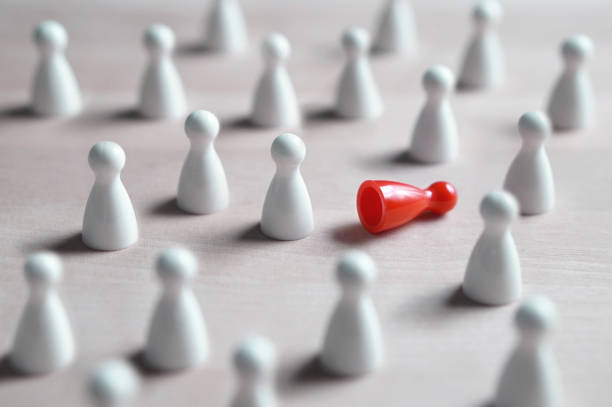Understanding peer pressure
Several studies have highlighted about 85% of high school students have felt peer pressure.
‘Peer pressure’ is real, and there’s no way one can escape it. But there are ways to handle negative peer pressure, so it doesn’t make you do things that you might regret sooner or later.
In simple words, peer pressure is when you do things that you wouldn’t otherwise do, to feel accepted and valued by your peers. These peers can be your colony friends, classmates, friends, or colleagues. These are individuals who are about the same age as you and are involved in similar stuff as you. You may not consider all your peers to be your mates, but they can all still influence you.

Displeased female student bullied by her classmate standing alone in a hallway.
While developing positive peer relationships is a crucial part of personal and career development, it doesn’t have to compromise your value system and purpose.
Teenagers and young adults are more susceptible to peer influence. Studies have shown that peer influence can significantly describe their behavior, which is shaped by their want to feel belonged to their immediate group of friends or peers.
Just like a coin has two sides, peer pressure can be both positive and negative. When it is pushing you beyond your limitations to be your best, and bringing about positive changes to your behaviour and personality, peer pressure is good. Examples include, an individual becoming more empathetic, and promotion in social skills seen as improved participation in activities both in school and personal life.
Peer pressure is bad when an individual chooses to do things that normally don’t appeal to him/her. Examples can be smoking, drugs, or even having antisocial behaviour. Such changes are not desirable and can greatly affect a person’s life.
The approximate number of teenagers who are into regular smoking is over 3 million across countries. According to Kaiser Foundation, over 50% of teenagers experience peer pressure to engage in sexual activities early on in their life.
We all think of this negative peer pressure when the word “peer pressure” comes up. It starts with making you feel that you’ve to do something to be accepted in the group where you are and often ends up making you feel guilty or upset for doing things that are against your beliefs or values.
For teenagers, peer pressure can come in many forms. Right from choosing similar clothes, hairstyles, and accessories as friends to changing in vocabulary and way of talking in accordance to your peers’ ways to consuming alcohol and drugs because peers do, or projecting a misleading image of yourself and your life on social media, everything is an effect of peer pressure.
How can parents or well-wishers identify?

Closeup shot of two unrecognisable people holding hands in comfort
Usually, the signs of peer pressure are very explicit and can be recognized easily in teenagers. If an individual is behaving out of character, has a fear of missing out or not fitting in, and tries to copy others – a conversation is needed.
Negative peer pressure pushes individuals to engage in risk-taking behaviours while being aware that they aren’t good habits. Students became unorganized and distracted which shows as downfalls in academics. In some cases, negative peer pressure could also be a cause for growing barriers among family members. Individuals feel ashamed of showcasing their family life and home environment to peers, which makes them detached from their families.
Subject to peer pressure, teenagers usually start behaving a bit like followers and can be easily influenced.
If you think you’re unable to comprehend these signs, get help from a counselor on Mindwire.
Coping with negative peer pressure
An individual is less likely to be influenced by others if they have a strong sense of themselves. Some influence is important- which is patents’ influence also, as that helps shape the value system and decision-making ability in an individual.
The journey starts and continues by getting the balance right between being yourself and fitting in.
Here are some of the strategies that can help maintain that balance –
Keep all lines of communication open
Parents must try to stay connected to their children and make them feel heard. They should be able to come and talk to you whenever they’re feeling pressure to do something that they aren’t comfortable with.
Parents and children can have a secret code to communicate for times when children need assistance with getting out of difficult situations.
Not just that, one must encourage a wider social network (friendships from various sources including family, and extracurricular activities) that can be tapped for support when some friendship goes wrong or one has to make some difficult choices.
Learn to say no
This is not only one of the hardest skills to master but also the best. Take the example of peer pressure for smoking. The idea is to learn ways to say no. It might not be a direct “no, thanks”. It could be something like “I don’t like the way it smells”, or ” it aggravates my asthma”. This makes your argument more strong and allows you to be yourself while being with others.
Give more importance to young self-compassion
Often we understand others much more than we understand ourselves. We’re ready to give care, warmth, and love to others, but we go hard on ourselves. That’s where we unknowingly begin to disrespect ourselves -others can easily do.
Building self-compassion from an early age helps you be kind to yourself, and treat yourself with the same warmth, love, and understanding as you would treat others. This helps one handle any kind of stress or anxiety that comes with instances of peer pressure. A strong relationship within yourself, and the commitment to save yourself from any kind of damage will also keep you alert when making bad choices that can disrupt your mental peace and happiness.
Confidence is the key
Confident individuals are better at resisting peer pressure. They are more capable of making sensible and informed decisions and are ready to ignore people and situations that can threaten their values and beliefs.
As parents, building teenage confidence is very essential. This can be done by encouraging your child to try new activities, appreciating them and rewarding their smallest wins, and by praising your child more often.
Listening to the inner self
Often in life, we’re so busy focusing on the outside world that we never listen to our inner voice. It’s common to ignore your gut feeling, while it always warns when something is not going right. Pay attention to how you feel. if a situation doesn’t feel right, it’s probably not right. Even if people around you seem okay with it, it still might not be right for you.
Listening to that inner voice can help make the right decisions at the right time.
See a student counsellor
A counsellor can not only help you deal with. peer pressure better, but can also help you make informed and practical career decisions.
On one hand, peer pressure deteriorates the mental health of a teenager, and on the other hand, it can have a significant impact on career choices. To avoid such awful decisions, make sure you see a counsellor and get an unbiased and expert opinion.
Replacing negative peer pressure with positive peers pressure
According to several researchers, positive peer relationships and meaningful interaction are associated with optimistic student outcomes including higher grades, better interpersonal skills, improved self-esteem, and higher emotional intelligence. All of this, in addition to the “feeling of being less” essential for human existence.
A fine example of this is healthy competition amongst students in a school that helps them all attain their full potential. In an optimistic view, peer pressure helps students adapt and develop skills that allow them to better deal with a specific environment is something every individual needs to outshine in life.
So, what’s the verdict?

Stop smoking concept fist destroying cigarette packet
Peer pressure cannot be escaped, and is not always negative. The key is to find your balance and to make the best of the peer pressure, which will help young adults thrive. Mindwire is always here to help if you need to talk about your concerns or get help for your mental health. Book a slot for your student counselling session today and get yourself the assistance you need to cope with everyday challenges in your student life. If you’re an adult, you could also book a counselling session with our experts to get any kind of mental healthcare assistance.

